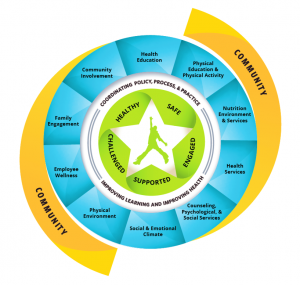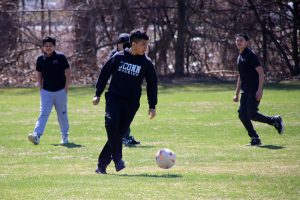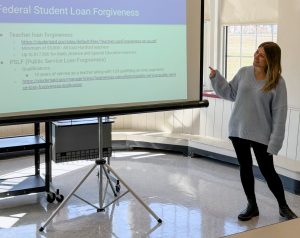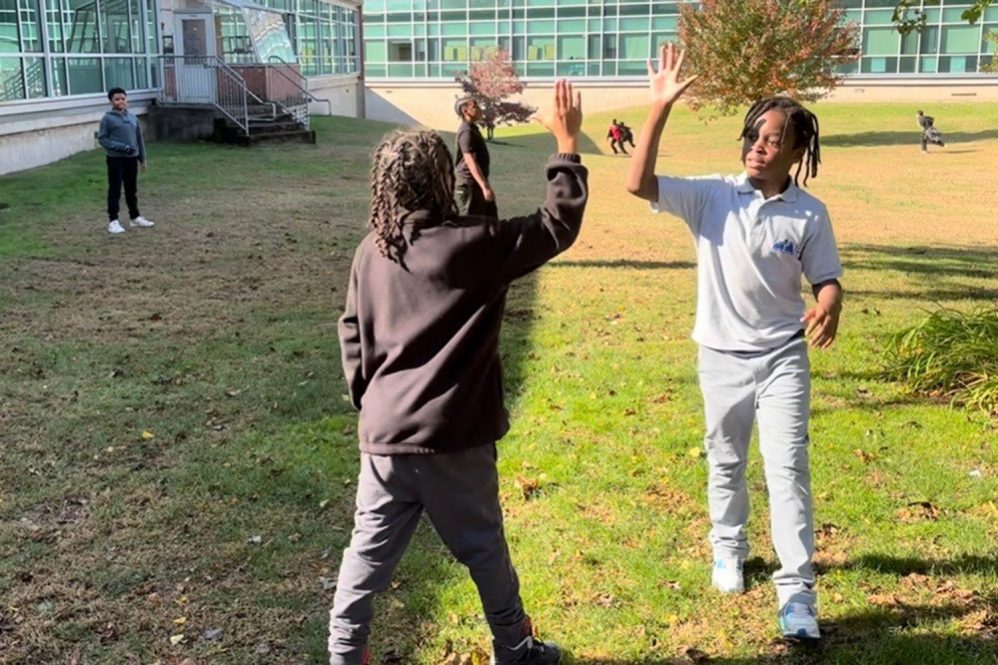An eighth grade student from East Hartford is making new friends outside of class. Across town, several teachers have applied for loan forgiveness programs in order to reduce financial stress. These are the direct impacts middle schools in East Hartford are enjoying after embracing the Whole School, Whole Community, Whole Child (WSCC) model and they serve as examples for schools beyond their district.
Each of the 15 schools in East Hartford has a WSCC team as a part of The Connecticut Whole School, Whole Community, Whole Child (CT WSCC) Partnership. This is a five-year collaboration between the UConn Collaboratory on School and Child Health and the UConn Rudd Center for Food Policy and Health. It is led by co-principal investigators Sandra Chafouleas and Marlene Schwartz and co-investigators Jessica Koslouski and Kathleen Williamson ’13 MA ’17 Ph.D. The goal of the partnership, funded by the Centers for Disease Control and Prevention’s Division of Adolescent and School Health, is to protect and improve the health and well-being of school-age children and adolescents in Connecticut.

The WSCC model is the CDC’s framework for addressing health in schools. It focuses on meeting the needs of the whole child by ensuring students are healthy, safe, supported, engaged, and challenged. The model emphasizes the integration and coordination of evidence-based policies and practices across a range of domains related to health and learning, as well as the important role of the community in supporting schools.
“There are two arms to the partnership,” says Chafouleas, a Board of Trustees distinguished professor in Educational Psychology. “First, we have our statewide work, which involves the delivery of professional development and technical assistance to help districts strengthen their implementation of evidence-based policies and practices aligned with the WSCC model. The other arm of the project is our work with one priority school district to provide in-depth training and ongoing support over five school years, the life of the project. East Hartford Public Schools is that priority district, and we are so grateful to be collaborating with their district and school leaders.”
In Year 1 of the project, East Hartford’s school WSCC teams – formerly Health & Wellness teams – participated in a series of professional learning sessions led by UConn. The series began with a focus on building knowledge of the WSCC model and whole child development. Next, the teams completed structured assessment activities, including analysis of current practices and school-level data, to identify their WSCC domains of focus, such as Health Services or Physical Education & Activity. Finally, teams wrote goals and action plans to strengthen their practices within those domains over this school year, which is Year 2 of the project.
East Hartford Middle School (EHMS) identified Social and Emotional Climate as its domain of focus and developed a plan to improve that climate through physical activity.
“Since the pandemic we have seen a rise in anxiety, depression, and emotional dysregulation,” said EHMS principal Joe Pearce. “Couple this with the normal middle school stressors and challenges teens and preteens face, and we felt this would be beneficial for our school.”
After developing the action plan, the school’s WSCC team, led by teacher Meredith Krauss, created a program called Empower Health. This takes place daily during the school’s 15-minute advisory period. On Mondays, students participate in classroom activities based on the CASEL framework for social and emotional learning. On Tuesdays through Fridays, students enjoy physical activity outside, which reinforces the social and emotional learning in the classroom.
With the CT WSCC Partnership’s support, EHMS purchased supplies for team-based games such as soccer, kickball, and football, as well as independent activities such as jumping rope and hula hooping. Student and teacher surveys demonstrate the positive results this program is already creating among the student body.
One student said, “This is something that I can use to let off some energy after class.”

Several others indicated that engaging in physical activity through the project has helped them socially.
“I met people from my team that I don’t have classes with, and I made new friends,” said one sixth grader.
A seventh grader believes the program helps students “feel more welcomed in their team and the school,” and an eighth grader said, “some of my friends are usually quiet but I get them to engage.”
Pearce said this program is the “number one success from this school year.” The social emotional lessons coupled with the physical activity time outside has led to students feeling better.
“Middle school students need to move, put their phones down, get fresh air and be around their peers in a safe environment,” he said. “This program has provided so much to our school.”
East Hartford’s International Baccalaureate middle school, Sunset Ridge School, identified Employee Wellness as a key area for improvement and a domain to focus on during the 2024-2025 school year. The Sunset Ridge WSCC team, led by teacher Nicole Wysocki, recognized that the well-being of its staff directly impacts the overall school environment and student success.
“Many educators experience stress related to day-to-day expenses and long-term financial security,” Wysocki said. “By providing financial literacy and support opportunities, we aimed to reduce this burden, helping teachers feel more secure in their current and future financial standing. Ultimately, our goal was to foster a healthier, more supported staff, creating a positive and stable foundation for our students.

The WSCC team hosted the district’s financial advisor, who presented financial planning strategies, investment options, and retirement benefits tailored to educators. The team also hosted a session focused on college tuition reimbursement and discounts available to teachers.
One staff member said, “I enjoyed having the variety of opportunities at our meetings that we might not think to seek out ourselves in our busy schedules.”
As a direct result of these sessions, several staff members made financial changes and decisions, such as starting retirement accounts and filling out paperwork for teacher loan forgiveness.
Throughout the school year, all of East Hartford’s school WSCC teams have worked to implement and measure the impact of their action plans. In future years, teams will repeat these assessment and action-planning processes to continue to strengthen their whole child practices.
The East Hartford District WSCC Team is also engaged in work that parallels that of the school teams. Their focus is on integrating and coordinating whole child practices across the district and in collaboration with the Town of East Hartford and community partners, such as InterCommunity, the health care provider for East Hartford’s school-based health centers.
“Taken together, I think the efforts of East Hartford Middle School and Sunset Ridge School are incredible examples of the WSCC model in action,” says Tracy Stefano, K-12 supervisor of health and physical education in East Hartford, who leads the district’s collaboration with UConn on this project. “The UConn team really believes that it’s not meant to be a prescriptive approach. The model is meant to provide an organizing framework that is flexible based on context, allowing educators to identify the priorities in their settings, for their community. That’s exactly what you see with the middle schools in East Hartford – two different, yet highly meaningful whole child initiatives.”
Districts interested in learning more about the CT WSCC Partnership can visit ctwholechild.collaboration.uconn.edu. Registration is now open for the 2025 WSCC Academy, a day of free professional learning for district wellness teams in Connecticut on May 21.



